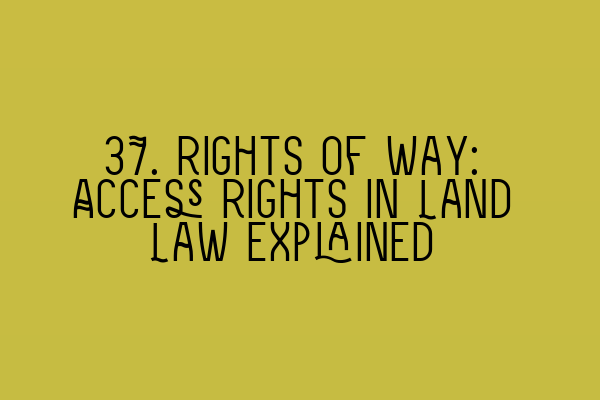37. Rights of Way: Access Rights in Land Law Explained
In the complex world of property law, understanding the rights of way and access rights is essential for both property owners and those who wish to access or use another person’s land. In this article, we will delve into the intricacies of access rights in land law, shedding light on the key principles and providing valuable insights.
What are Access Rights?
Access rights refer to the legal entitlement an individual has to access and use a specific piece of land, regardless of whether they are the landowner or not. These rights are crucial for ensuring fair and equitable use of land, as well as facilitating convenient movement and access to essential amenities.
In England and Wales, access rights are primarily governed by common law and statutes such as the Law of Property Act 1925 and the Land Registration Act 2002. The existence and extent of access rights are typically determined by the specific circumstances and the legal agreements or arrangements surrounding the land in question.
Types of Access Rights
Access rights can take various forms, each with its own legal implications and ramifications. Here are some of the most common types of access rights:
- Public Rights of Way: These are access rights granted to the general public to pass through and use specific paths or routes, such as footpaths, bridleways, and byways. Public rights of way are typically established by long-standing public usage or formal dedication.
- Private Rights of Way: These access rights are granted to specific individuals, usually for the benefit of their adjoining land or property. Private rights of way may be created through legal agreements, such as easements, or through longstanding, undisputed usage of a particular route.
- Easements: An easement is a legal right granted to one party to use the land of another party for a specific purpose. Easements can include rights of way, but they may also encompass other usage rights, such as the right to access utilities or maintain essential infrastructure.
Establishing Access Rights
Establishing access rights can be a complex and nuanced process, often requiring legal expertise and a thorough understanding of land law principles. The specific method for establishing access rights depends on the circumstances and the nature of the rights being sought.
Public rights of way are generally established through long-standing public usage or by formal dedication by the landowner. Private rights of way, on the other hand, may be created through legal agreements, such as express grants or reservations in property transfers, or through proving a longstanding, continuous, and unquestioned exercise of the right.
Easements are typically created through legal agreements, either expressly or by implication, and are often registered against the title of the affected properties. The terms and conditions of the easement, including the extent of the access rights granted, are usually set out in the legal agreement.
Resolving Disputes
Unfortunately, disputes over access rights are not uncommon, and they can quickly escalate if not handled properly. When faced with an access rights dispute, it is advisable to seek legal advice from an experienced property law solicitor who can provide guidance and help resolve the issue in a fair and reasonable manner.
Resolving access rights disputes often involves examining the relevant legal agreements, establishing the historical usage and intention of the parties involved, and considering any applicable statutory provisions or case law. Depending on the circumstances, negotiation, mediation, or even court proceedings may be necessary to reach a satisfactory resolution.
Conclusion
Access rights are a vital component of land law, ensuring that individuals have the right to access and use land for various purposes. Whether it’s public rights of way, private rights of way, or easements, understanding the legal principles and requirements surrounding access rights is crucial for both landowners and those seeking access or use of land.
If you have any questions or require legal assistance with access rights, please {{ contact us}} today. Our team of expert property law solicitors has deep knowledge and experience in handling access rights matters and can provide the guidance and representation you need.
